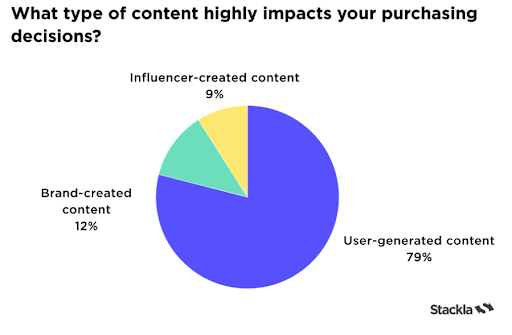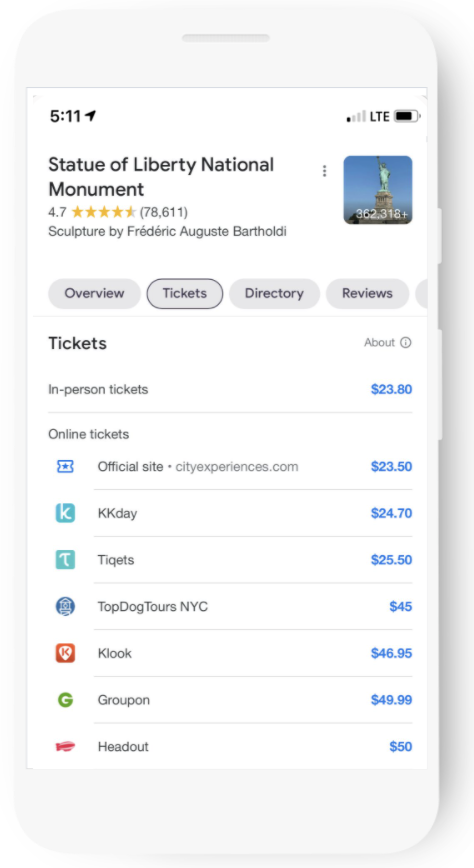Damian Rollison | Sep 27, 2021 7:56:34 AM
5 Min Read
In this week’s update, learn about the trust consumers place in recommendations from peers; removing fake or malicious Yelp reviews; what you can and can’t edit in Google hotel profiles; new booking links and expanded info for travelers; buying gas with Google Assistant; and visual search with Snapchat’s Scan tool.
A new and fascinating survey from Stackla illustrates just how important user-generated content (UGC) is to consumers. The survey finds that 73% of consumers want brands to provide more authentic experiences, and 70% are looking for greater personalization. But they’re not just waiting for brands to fill this need. Instead, they’re looking to the recommendations and shared experiences of fellow consumers as primary sources of authentic information. Nearly 60% of those surveyed said consumer-generated content is the most authentic, and 80% said UGC has a strong impact on purchase decisions -- 8.7x stronger than influencers and 6.6x stronger than brands.
The reliance on UGC increases in younger population groups. While 48% of Gen X respondents say they would not do business on an ecommerce site that had no consumer reviews or photos, the number increased to 60% for Millennials and 64% for Gen Z. Younger consumers are especially interested in product experiences shared via photos and videos, according to the study.

Mark Crowe has a new post at BrightLocal that helpfully explains the steps for getting malicious or fake reviews removed from Yelp. Crowe notes that 92% of consumers say they are less likely to use a business with negative reviews. Of course, negative reviews that legitimately express a user’s opinion about their experience with a business cannot simply be removed at the business owner’s whim. But if you suspect a negative review has been paid for (say, by a competitor); that it fails to reflect the actual experience of the author; that it misrepresents the facts; that it is based solely on previous interactions with your business, not on the experience the review is about; or that it is promotional or represents a conflict of interest, then you can appeal to Yelp to have the review removed, as Yelp’s guidelines forbid reviews that meet any of these criteria. You’ll want to make a strong case for the removal of the review, Crowe recommends, including gathering up all the evidence you can from your own business records or, if relevant, from the behavior patterns of the reviewer as exhibited on Yelp. Once the review has been reported, it may take up to a week for the Yelp team to make a decision. If the review is removed, both the business and the reviewer will be notified.
It can be confusing to try to keep track of the elements that appear in public business profiles on Google, especially so because only some of them can be influenced by the business via the Google My Business platform. There’s probably no more challenging vertical in this regard than hotels, much of whose business profile real estate has been co-opted for ad display as well as data elements that come from Google and not from the business owner. Tim Capper, in a recent post, offers a lesson on the anatomy of a hotel knowledge panel, focused specifically on what you can update and what you can’t.
Many of the details Capper covers are applicable to other business types. For instance, he notes that you can upload photos to the hotel’s business profile, but you cannot control which photo is displayed as the cover photo. You cannot remove the Street View imagery from a profile, but you can move your business’s map pin to a location that more accurately reflects the front of the building. Businesses of all types struggle with the same issues. More specific to hotels are components like the “Book a Room” button, which is enabled by the presence of content from third parties like Expedia and can’t be controlled by the hotel. Even the descriptive text under “Hotel details” is supplied by Google and can typically only be edited by request if details are inaccurate.
Google has announced it is preparing a new service called Things to Do on Google that will offer booking links and information for travelers for a variety of landmarks and destinations, such as “wine tasting in Paris or bike tours in California,” in the words of the announcement. As with hotel bookings, Google will allow third party providers -- such as tour guides and package ticket resellers -- to supply booking information, and will offer both free and paid options for booking placement. A new help page explains how attraction owners and third parties can participate in the Things to Do platform.

Image courtesy Google / Search Engine Roundtable
The evolution of digital connectivity for automobiles takes another step with an announcement from Google that Android Auto users will soon be able to use Assistant at the pump by saying, “Hey Google, pay for gas.” Through voice interaction, users can indicate the pump number, choose a payment method through Google Pay, and select the fuel grade. Though the experience is not entirely contactless, it does remove the need to physically contact keypads and other high-touch areas. The service also works with Android phones and is currently being piloted at Exxon and Mobil stations, with support for Shell, Conoco, Phillips 66, and 76 stations coming soon.
Street Fight contributor Mike Boland has been tracking Snapchat’s growth as a commerce platform, and in his latest post on that topic he discusses Snapchat Scan, a relatively new visual search tool that allows users to point their camera at an object or product and get information about it. Scan can now recognize hundreds of dog breeds, thousands of plants, and millions of songs. As an aid for clothes shopping, Scan recognizes the style of clothing shown in a camera view and suggests where similar clothing can be purchased online. Soon, you’ll be able to scan food ingredients as you shop for groceries and get recipe recommendations. Since visual search is inherently localized, more use cases related to local businesses as well as online commerce are likely to develop as the tool evolves.
Topics: Monday Memo

VP of Market Development and Strategic Partnerships
Offer Post Justifications Spotted in Local Results
Oct 4, 2021 8:47:46 AM
Monday Memo: More than Brands and Influencers, Consumers Trust Each Other
Sep 27, 2021 7:56:34 AM
Monday Memo: Google Adds “Latino-Owned” to GMB Identity Attributes
Sep 20, 2021 7:58:58 AM
Monday Memo: New Study Shows 94% of Consumers Use Online Business Directories
Sep 13, 2021 7:16:55 AM
Monday Memo: The Page Experience Update Has Fully Rolled Out
Sep 6, 2021 7:43:45 AM